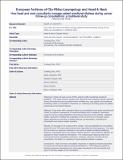How head and neck consultants manage patients’ emotional distress during cancer follow-up consultations : a multilevel study
Abstract
Head and neck cancer (HNC) patients suffer substantial emotional problems. This study aimed to explore how utterance-level variables (source, type and timing of emotional cues) and patient-level variables (e.g. age, gender and emotional well-being) relate to consultants’ responses (i.e. reducing or providing space) to patient expressions of emotional distress. Forty-three HNC outpatient follow-up consultations were audio recorded and coded, for patients’ expressions of emotional distress and consultants’ responses, using the Verona Coding Definitions of Emotional Sequence. Multilevel logistic regression modelled the probability of the occurrence of consultant reduce space response as a function of patient distress cue expression, controlling for consultation and patient-related variables. An average of 3.5 cues/concerns (range 1–20) was identified per consultation where 84 out of 152 total cues/concerns were responded by reducing space. Cue type did not impact on response; likewise for the quality of patient emotional well-being. However, consultants were more likely to reduce space to cues elicited by patients, as opposed to those initiated by themselves. This reduced space response was more pronounced as the consultation continued. However, about 6 min into the consultation, this effect (i.e. tendency to block patients) started to weaken. Head and neck consultants’ responses to negative emotions depended on source and timing of patient emotional expressions. The findings are useful for training programme development to encourage consultants to be more flexible and open in the early stages of the consultation.
Citation
Zhou , Y , Humphris , G M , Ghazali , N , Friderichs , S , Grosset , D & Rogers , S 2014 , ' How head and neck consultants manage patients’ emotional distress during cancer follow-up consultations : a multilevel study ' , European Archives of Oto-Rhino-Laryngology , vol. Online First . https://doi.org/10.1007/s00405-014-3209-x
Publication
European Archives of Oto-Rhino-Laryngology
Status
Peer reviewed
ISSN
0937-4477Type
Journal article
Collections
Items in the St Andrews Research Repository are protected by copyright, with all rights reserved, unless otherwise indicated.

